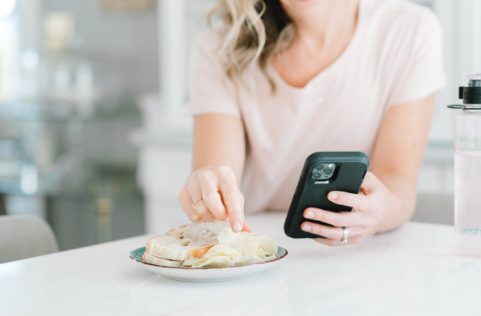Over the years, diet culture has constantly evolved with the times. Whether it was clinging to the idea of low fat, low carb, or “clean eating,” diet culture can be a very crafty shapeshifter in an attempt to keep its participants interested. It makes you think that maybe, just maybe, a diet will work *this time*.
Recently, diet culture has started to get very sneaky and present itself in subtle ways such as aligning itself with the framework of Intuitive Eating. For example, it may be a diet rather than Intuitive Eating if it advertises weight loss by way of IE principles. Or, they may claim that “all food fits” as long as it fits within your daily calorie goal. Warning: these are oxymorons. The truth is that diet culture, at its core, goes against the framework and principles of Intuitive Eating.
What is Intuitive Eating?

Intuitive Eating (IE) is a framework created by two registered dietitians, Evelyn Tribole and Elyse Resch, and is guided by ten principles, which you can find in their book, linked here. These principles guide you through the self-care framework and help you understand and challenge your previous thoughts about your relationship with food. Intuitive Eating puts you back in charge of your eating experience and helps you to get in touch with your body while bringing pleasure and satisfaction back to eating.
With diet culture coming on stronger than ever, it’s important to recognize what Intuitive Eating is and what it is not. It is easy to get lulled into a diet when it uses phrases like “food freedom,” “hunger and fullness cues,” or “food police.” However, just because it looks and sounds like IE does not mean that it truly is IE. Therefore, We have highlighted some red flags below to help you spot “fake Intuitive Eating” when it rears its ugly head.
How to Spot a Diet Masked as Intuitive Eating
1. It is attached to a weight-loss programs or aligns with weight loss principles

Intentional weight loss interferes with Intuitive Eating. That is why at the very beginning of the IE book, it is asked that when starting Intuitive Eating, that you place weight loss on the back burner. When beginning your journey to Intuitive Eating, you are asked to tune into what your body truly wants and needs at the moment.
Thoughts linked to weight loss or how to change your body shape and size may impede your ability to truly tune into yourself and understand what your body is asking for. Desiring weight loss is natural and normal in our diet culture. So, it’s important to understand that when you are navigating Intuitive Eating, weight loss is not a goal. Your body will land where it naturally decides to land - at its set point.
2. It Tells You Certain Types of Foods You Can and Can't Have

Principle three in Intuitive Eating, Make Peace with Food, would have to disagree with this one. When following the framework of IE, you are allowed to have any food you want, whenever you want to have it, as much as you need.
Those still rather entrenched in diet culture sometimes hear this and think, “No, no, not me. I won’t be able to stop eating if I allow myself to have whatever I want”. Odds are, you feel out of control around these foods because they have been “off-limits” for so long.
Diet culture thrives on telling you that certain foods are “good” and should be eaten, while others are “bad” and should be avoided. On the contrary, when engaging in Intuitive Eating you are asked to Reject the Diet Mentality and reintegrate the foods you have been avoiding. When these types of foods are offered and available more frequently, they tend to lose their appeal, allowing you to eat them in a way that feels good for you and your body!
3. It focuses solely on you eating when you’re hungry and stopping when you’re full
While Intuitive Eating does focus on tuning into your hunger and fullness signals - it is a lot more nuanced than just “eat when you’re hungry and stop when you’re full”. That sounds more like the “Hunger Fullness diet.”
Intuitive Eating welcomes you to honor your hunger as a cue that your body needs energy and to start to understand your own fullness. However, there will be times when you may eat even when you are not hungry, and this is perfectly okay.
Here are a few examples of these nuances below:
- You are going into a four hour meeting that starts at noon and are not feeling your hunger cues just yet. You decide to grab something to eat anyway to stay fueled and focused during your meeting, knowing that you will be unable to nourish your body until afterward.
- You are out at a restaurant with your family and enjoy an amazing meal. You are feeling satisfied afterward but your family asks if you want to go to your favorite ice cream place for dessert. While you are not feeling physically hungry, you are feeling nostalgic and may want to try some ice cream. You enjoy and savor every bite!
- You are enjoying a nice meal with your friends and end the meal feeling more full than usual. You recognize that you enjoyed an amazing meal with some of your favorite people and understand that fullness is normal and this feeling will pass. You continue to engage and laugh in the conversation with your friends.
4. It’s aligned with the idea of a “cheat day”

The concept of a cheat day by itself indicates that you are a) doing something “bad” and b) controlling intake on other days of the week. Intuitive Eating challenges the idea that foods are “good” or “bad” and teaches that food truly has no moral value. Instead, it helps you understand that this black and white thinking is often born from diet culture’s messaging.
By following IE, you are allowed to eat what you want 24/7, meaning that you never need a cheat day. Instead, you are guided by your own body: hunger cues, cravings, schedule, needs, and gentle nutrition principles to help you choose the meals and snacks that work best for you.
5. It “cherry-picks” one or two principles
As mentioned, Intuitive Eating is guided by ten principles - and you cannot have one without the other. They feed into and fuel each other. Without understanding and practicing all principles you are missing out on all that Intuitive Eating means.
If you notice companies preaching about one or two principles but not living out the others, it makes sense to question how real their claim to Intuitive Eating is.
Remember, diet culture can be sneaky. Recognizing some of the above red flags can allow you to call it out for what it is! Intuitive eating is not a diet. Period. End of story.
Instead, it is a way to break free from diet culture and allow you to reclaim food freedom in your life by healing your relationship with food.

No matter where you are on your Intuitive Eating journey, we want to be there to support you every step of the way. Having other like-minded people around you for encouragement and engaging in a good vent session can be so helpful as you navigate your relationship with food and body.
The Jumpstart to Intuitive Eating Course is a place for you to start exploring your own beliefs around food. Interested? Visit our website and see how you can get started today. Whether that’s through joining our newsletter to receive more resources or meeting with one of our dietitians to further your healing journey, we’re here for you or someone you love who is struggling with an eating disorder.
We are a team of experts who typically serve clients located in Massachusetts and Colorado. We proudly treat our clients virtually and would love to see if we’d be the right fit for you. Contact our team today to learn more!
Comments Off on Intuitive Eating vs. Dieting: How to Spot the Difference